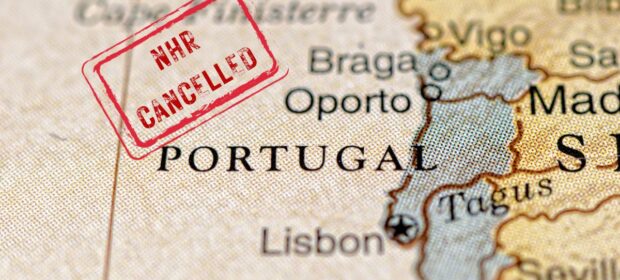Living in Portugal as an expat?
Looking for some direction in your financial and tax planning?
By Portugal team
This article is published on: 14th April 2024

Living in Portugal as an expat?
Looking for some direction in your financial and tax planning?
Lisbon area: 24th April 10am to 1pm
Palacio Hotel, Estoril

Algarve: 25th April 10am to 1pm
Magnolia Hotel, Quinta do Lago

By Portugal team
This article is published on: 31st March 2024

Due to the increase in interest rates over the last couple of years, cash has been a relatively attractive investment however as rates on deposits become less attractive, more investors are turning to investment portfolios to make their money work harder. But what type of return can I expect from an investment portfolio?
The return you achieve from your portfolio is determined primarily by the make-up of the underlying portfolio i.e. the split between shares, bonds and other assets such as property and commodities etc. This in turn is determined by your tolerance for risk and volatility.
Are investments really ‘risky’
Risk is misunderstood and is often confused with volatility. Risk can be more accurately defined as the chance of permanent loss of capital whereas volatility is simply the degree to which investments move up and down.
Although many feel shares in companies are a “risky” investment, if we look back over the past several decades, we can see the chance of permeant loss is very small when investing in blue-chip companies. These types of companies are in are in the business of trying to make a success of themselves, not run themselves into the ground!
Volatility is what scares most investors, the ups and the downs. But putting this into perspective, most of us own a home and are aware of what the property market does, it goes up and down. But unlike with an investment, you don’t have a ticker on your post box telling you the daily price, so you don’t see the volatility and therefore, do not “feel” the risk.
The reality
Figures from Credit Suisse show that over a 123-year period starting in 1900, shares in developed equity markets have generated returns at 5.1% above inflation and emerging equity markets have achieved 3.8% over inflation.
The Credit Suisse figures also show that shares have outperformed cash (and bonds) in every one of the 21 countries their data covers over that 123 year period.
This is quite remarkable given this period covers two world wars, two global pandemics, the great depression, dot-com bubble, and the global financial crisis!
So, shares could actually be considered lower risk than cash or property because of their proven ability to keep pace with inflation over time and therefore protect your money in real terms.

What steps can you take to stack the odds in your favour?
The return you receive as investor will be determined by a range of factors besides the composition of your portfolio and there are certain steps you can take to increase your return expectations:
Select the right funds
The difference in fund performance can be startling e.g. in a recent analysis we carried out of the US equity sector, the top performing funds was up 67% whereas the worst was down -25%!
Review regularly
Whilst a buy and hold approach is one of the most popular strategies for investors, reviews are essential. Not only to ensure your risk level, asset mix and diversification are in line with your objectives, but also to ensure your portfolio remains relevant. Looking over a 40-year period at the FTSE 100, only 24 companies (or arguably 35 including mergers and acquisitions) are still in the index since 1984.
Minimise fees
Minimising fund management and advisory costs puts more money back into your portfolio and leads to better net performance.
Minimise tax
With interest, dividends and capital gains tax at 28% for standard residents (note, 28% capital gains tax does still apply to Non-Habitual Residents), tax is one of the biggest eroders of investment return. So, give some thought to how you hold your portfolio and take advantage of the different tax “wrappers” available to Portuguese tax residents but keep an eye on fees and only seek advice from qualified advisers.
By Portugal team
This article is published on: 29th March 2024

Understanding what is taxable here in Portugal and at what rate, can be confusing. With a lot of incorrect, out of date or just misunderstood information out there, we take a look at the commonly misreported points.
Those with the advantageous NHR status (Non-Habitual Residency) are well aware that foreign interest and dividends are taxed at 0%. But what many do not realise is that this does not apply to funds.
Most people are invested in funds or ETFs, rather than direct stocks, and interest or dividends arising from these are not tax exempt under NHR.
Another misconception is that if you do not take a withdrawal from your investments, you do not have to declare income/gains and pay tax.
Unless your investments are within a pension structure or an offshore bond, income, dividends and gains are taxable on an arising basis i.e. if a fund is sold/switched. It does not matter that you have not physically had anything paid to your bank account or nothing has been withdrawn from the investment. The tax office are increasingly challenging investors in this respect, so it is important to check that you are making the right declarations in Portugal.
From 1st January 2023 any gain arising from the disposal or transfer of shares/securities held for less than 365 days will be taxed at progressive rates of income tax i.e. 48% plus 2.5%/5% solidarity tax, if your total taxable income (including the gain) is more than €81,199.
Shares/securities held for more than 365 days, or where your total taxable income including the gain is below the threshold, the standard tax of 28% will apply.
This is important if you or your investment adviser is trading, rebalancing or switching regularly.

Portuguese residents must declare and pay tax in Portugal on worldwide income and gains. Individuals commonly think that they can continue to pay taxes in the UK as Portuguese tax residents or choose where to pay taxes on certain assets.
Whilst certain income/gains do remain taxable in the UK i.e. those arising from real estate, this must still be reported in Portugal and any relevant tax due paid. A credit is given for tax paid in the UK, so you will not pay tax twice.
Another common error is pension income. This is taxable in Portugal, not the UK, even if the pension is a UK pension. The only exception to this is government service pensions e.g. teachers, local government, police etc. The UK State Pension is not a government service pension and is therefore taxable in Portugal, not the UK.
Whilst the UK will record the drawdown as tax-free cash (PCLS) for UK purposes, this is a UK tax break for UK tax residents. Portuguese residents receiving their “tax-free cash” will be taxed on the lump sum as standard pension income in Portugal.
The standard rule on property sales for Portuguese tax residents is, 50% of the gain is taxable at scale rates. This is the same if you are selling a property in Portugal or overseas.
If the property you are selling has been your main home in Portugal for at least 2 years, you may be able to qualify for the main residence reliefs and reduce or eliminate the capital gains tax.
If the property has an AL license however, the tax on sale is applied to 95% of the gain, not 50%. Individuals would have to wait 3 years following the cancellation of the AL license to benefit from the standard rates of tax.
When utilising tax efficient structures it is important to consider the tax consequences. Some structures only tax gains and others do not distinguish between capital and gains.
A common example is a simple platform or bond; here only gains are taxed, however a trust or QNUPS taxes the capital and the gain. So with the latter, you will pay tax even if you have not made a gain or made a loss!
By Portugal team
This article is published on: 27th March 2024

Due to the increase in interest rates over the last couple of years, cash has been a relatively attractive investment however as rates on deposits have started to fall, more investors are again turning to investment portfolios to make their money work harder.
But as the returns fall on cash accounts and short-dated bonds, where can investors turn?
Don’t fall into the reinvestment risk trap
As fixed terms come to an end, many institutions reoffer new terms but with lower rates. After becoming used to decades of very low (or no) interest being offered on savings, it is still easy to find any savings rate above zero attractive – even though we know this is well behind inflation, so the value is going backwards in real terms.
With cash looking less attractive as a long-term option, savvy savers are looking back to the markets to get their money working for the longer term.
But aren’t investments ‘risky’?
Risk is misunderstood and is often confused with volatility. Risk can be more accurately defined as the “chance of permanent loss of capital”, whereas volatility is simply the degree to which investments move up and down.
Although many feel shares in companies are a “risky” investment, if we look back over the past several decades, we can see the chance of permeant loss is very small when investing in high quality “blue-chip” companies such as Apple, Nestle or BP etc.
Volatility is what scares most investors- the ups and the downs. But putting this into perspective, most of us own a home and are aware of what the property market does, it also goes up and down. But unlike with an investment, you don’t have a ticker on your post box telling you the daily price, so you don’t see the volatility and therefore, do not “feel” the risk.

What about returns?
The return you achieve from your portfolio is determined primarily by the composition of the underlying portfolio i.e. the split between shares, bonds and other assets such as property and commodities etc.
Despite the doom and gloom in the world at the moment, markets have done very well over 2023, and whilst cash has offered attractive rates of 5-6%, the S&P500 achieved 24% over 2023.
Longer term returns
Whilst the returns achieved in 2023 are not guaranteed to continue, if we look back at longer term records, figures from Credit Suisse show that over a 123-year period starting in 1900, shares in developed equity markets have generated returns at 5.1% above inflation and emerging equity markets have achieved 3.8% over inflation.
The Credit Suisse figures also show that shares have outperformed cash (and bonds) in every one of the 21 countries their data covered over that 123-year period. This is quite remarkable given this period covers two world wars, two global pandemics, the great depression, dot-com bubble, and the global financial crisis!
So, shares could be considered lower risk than cash or property because of their proven ability to keep pace with inflation over time and therefore protect your money in real terms.

What steps can you take to maximise your annual investment returns?
The return you receive as investor will be determined by a range of factors and there are certain steps you can take to increase your return expectations:
Select the right funds: The difference in fund performance can be startling e.g. in a recent analysis we carried out of the US equity sector, the top performing funds was up 67% whereas the worst was down -25%!
Review regularly: Whilst a buy and hold approach is one of the most popular strategies for investors, reviews are essential. Not only to ensure your risk level, asset mix and diversification are in line with your objectives, but also to ensure your portfolio remains relevant. Looking over a 40-year period at the FTSE 100, only 24 companies (or arguably 35 including mergers and acquisitions) are still in the index since 1984.
Minimise fees: Ensure you have a clear view of what you are paying. Minimising fund management and advisory costs puts more money back into your portfolio and leads to better net performance. Ensure you check and read all paperwork when making any investments, or even better, get a professional second opinion on value.
Minimise tax: With interest, dividends and capital gains tax at 28% for standard residents (note, 28% capital gains tax does still apply to Non-Habitual Residents), tax is one of the biggest eroders of investment return. So, give some thought to how you hold your portfolio and take advantage of the different tax “wrappers” available to Portuguese tax residents, but keep an eye on fees and only seek advice from qualified advisers.
By Portugal team
This article is published on: 25th March 2024

With the ending of the 10 year tax incentivised Non-Habitual Residence scheme (NHR) as at 31st December 2023, many are now reassessing their plans to move to Portugal and existing residents are also asking how the changes affect their plans.
Existing NHRs unaffected
Individuals with NHR status will not be affected and will continue to enjoy the benefits under the scheme until the 10-year period ends. But these individuals should taking advantage of the unique opportunity and tax plan for the future, even if Portugal is not a permanent move there are opportunities to wash out capital gains or draw lump sums at potentially lower rates than other countries.
Transitional NHR rules
NHR is still open to individuals who qualify under the transitional rules and applications are open until the end of 2024. The criteria are:
1. On 31st December you meet the conditions to qualify as a Portuguese tax resident, or
2. You become Portuguese resident by 31st December 2024 and have either:
If you are eligible but are not sure whether to push forward with the application, the benefits are very attractive. The main benefits being:

NHR 2.0 – the new regime
Although qualifying for the new tax regime is more difficult than the old NHR, the major benefit is that for 10 years there is 0% tax on all foreign source income and gains. The only exceptions to this are income from backlisted jurisdictions or pension income.
The new regime is open from 1st January 2024 and the main qualifying criteria are:
Expats & the standard regime
If you cannot qualify for either of the two tax schemes, Portugal can still be a financially attractive place to live – there is no wealth tax, inheritance tax or tax on transfer of capital into or out of the country.
Standard rates of income and capital gains tax can be comparable or better than the UK, depending on each person’s situation. It is also possible to establish investment and pension structures as a Portuguese tax resident to benefit from lower rates of tax.
Irrespective of which position you are in, planning is required to put yourself in the best position and it is never too late to start planning. Speak to several suitably qualified professionals, compare fees, and do not be afraid to get a second opinion or a sense check.
By Portugal team
This article is published on: 24th January 2024

There are so many questions, so many concerns, so many areas that need clarifying. Here we dispel some of the most commonly held misconceptions for expats who have chosen to live in Portugal.
To determine and maintain your residency in Portugal or any other country, you will need to follow certain rules regarding the amount of time you spend there and your residence could change year on year depending on your circumstances.
For instance, if you want to avoid being subject to UK taxes after leaving, you will need to limit the number of days you spend in the UK. This limit can range from as little as 16 days to as much as 182 days.
The tax system in the UK is notoriously complex and can have lasting effects on former residents who have not properly cut ties with the country. Despite leaving the UK, you may still be responsible for paying taxes there on income, capital gains, and even after death (inheritance tax).
Additionally, specific types of income and gains continue to be taxable in the UK even after you’ve left. As a result, you may need to file an annual tax return with HMRC in the UK as well as in Portugal.
Unlike income tax and capital gains tax, which are usually determined by your residence, your liability for UK IHT is based on your domicile status. This means that even if you no longer live in the UK, you may still be subject to UK IHT if you have a UK domicile of origin.
There are ways to minimise or eliminate your UK IHT liability, but it is a highly complex area and not as simple as setting up an offshore trust, gifting assets or establishing a QNUPS – UK anti-avoidance rules are extensive and highly effective. It’s important to seek specialist tax guidance as early as possible, as any challenges by HMRC will only occur after you’ve passed away.
Some assume that they have the flexibility to report their income and gains wherever it yields the greatest financial benefit or where they ‘have always paid taxes’, rather than where they are obligated to pay taxes.
As a resident of Portugal, you are required to declare your worldwide income and gains and pay the appropriate tax in Portugal. You may also be required to declare income and gains in the country where assets are physically held/registered, but there are rules in place in most countries to avoid double taxation.
The NHR program is a ten-year tax incentive scheme for new residents of Portugal. The name of the program can be misleading, as it suggests that you are not a resident of Portugal. In reality, NHR is intended for those who have not been tax resident in Portugal in the previous five years, and you must be legally resident in Portugal before you can apply for it.
This can lead to some confusion, causing some people not to apply for the NHR program, or even being discouraged from doing so, despite it being a financially advantageous decision in most cases.
Although the NHR scheme offers the opportunity to attain low or even zero tax rates, it requires careful planning to achieve the optimal outcome. Simply applying for the program is not sufficient, and you must take proactive steps to ensure that you are in the best possible position to benefit from it.
For example, not all foreign income is exempt from taxation, you may need to restructure your income sources to fully utilise planning opportunities, and generally, capital gains are not exempt under NHR.
Becoming a resident of Portugal can result in significant financial and tax benefits, but it is crucial to have a comprehensive understanding of the cross-border complexities involved, such as residency regulations and tax declaration obligations. Only with a clear understanding of these issues can you take full financial advantage and achieve the most favourable outcome.
By Portugal team
This article is published on: 2nd December 2023

What has happened?
The NHR (Non-Habitual Residence) 10 year tax incentivised scheme to new residents will officially end from 1st January 2024.
There is a new 10 year scheme introduced as a result of the 2024 Budget Law that offers benefits to select individuals. This is aimed at attracting those involved in the scientific research and innovation fields and will apply to those with roles in higher education and specific high value sectors.
Key points
Residency obtained after 1st January 2024
Those who obtain Portuguese residence after 1st January 2024 will not be able to apply for the NHR scheme unless you meet one of the transitional criteria below.
Those who cannot claim NHR status will be subject to the standard rates of Portuguese tax.
Transitional rules: applications open until 31st December 2024
Those who become resident in 2024 may still be able to apply for NHR if certain conditions are met. These are individuals with:
Existing NHR individuals
Those with NHR already will continue to benefit from the scheme until the end of the 10 year period.
Final words
It is expected that there will a high volume of applications for NHR and for embassy appointments so if you can, take action now.
If you do miss the NHR boat, Portugal can still be a very tax efficient place to live however more careful planning will be needed both before and after your move.
By Portugal team
This article is published on: 27th November 2023

In his Autumn Statement, Jeremy Hunt announced the introduction of an Overseas Transfer Charge (OTC) when higher value UK pensions are transferred to a Qualifying Recognised Overseas Pension Scheme (QROPS).
This is to take effect from 6th April 2024.
The implication
Each individual will have an “overseas transfer allowance” of £1,073,100.
Where the transfer to QROPS exceeds this limit, the excess will be taxed at 25%.
The limit applies to the total value of transfers to QROPS, not per scheme.
For example. Mr A has 2 pensions valued at £900,000 and £600,000. He transfers both of these schemes to a QROPS after the new rules have been introduced. The excess above the lifetime limit is £426,900. This excess is taxed at 25%, therefore the tax due is £106,725.
The result
If you are considering a transfer to QROPS and your pension benefits are close to or exceed £1,073,100, this should be done before the introduction of the new rules in April 2024.
If you would like to understand how a transfer to a QROPS could benefit you or if it is appropriate, please do not hesitate to get in touch.
By Portugal team
This article is published on: 22nd November 2023

Non-habitual residency (NHR) is a 10-year preferential tax status granted to new residents of Portugal and it has been a major draw to the country for many years.
The announcement at the beginning of October regarding the proposal for the end of NHR in 2024 was unexpected and has caused quite a stir amongst those who had longer-term plans to move to Portugal, as well as for those who may be concerned about the attraction of Portugal going forward.
The new rules have not yet been finalised and much can change before the 29th November, but what do we know right now?
The end of NHR?
At the time of writing, the proposal is that NHR will be abolished on 31st December 2023. However, the government has most recently announced a ´transitory NHR regime´ to ease in the new rules throughout 2024. This will guarantee the right of certain individuals to apply for NHR, but interestingly it also leaves the possibility open for the next government (elections to be held early March 2024) to either continue with the abolition, alter the current NHR rules, or maintain NHR in its current state.
Whilst the future of NHR is still very much uncertain, the transition rules mean that instead of a hard end to NHR at the end of 2023, qualifying individuals can still apply for NHR during 2024. This grandfathering in ensures that those who have been strategically planning their move and making life changes will not be left disadvantaged by a sudden withdrawal of the scheme.
Qualifying individuals are those with:
Recent and new residents
It is expected that there will a high volume of applications, so if you are a recent resident and have not yet applied, if you receive your residency status before 31st December 2023, or qualify in some other way as detailed above, apply as soon as you can.

Missed the boat?
More careful planning will be needed for those who move after the deadline has passed or do not meet the qualifying criteria.
As always, planning should ideally start in your originating country so you can make a ‘road map’ to take advantage of any windows of opportunity and tax reliefs in both countries. But the need for effective planning will be even more important with the uncertainty and potential end of NHR as new residents will immediately be subject to the standard rates of tax and will not have the grace period of the NHR period to soften the tax blow if restructuring is required.
Some important considerations for individuals in this position still contemplating the move are:
Current NHRs
One positive is that those with NHR can retain the advantageous tax status but even so, you should begin planning for the end of your NHR. Some important opportunities exist if you are planning to sell foreign property as the gain is tax-exempt during NHR but taxable afterwards, or if you are drawing tax-free dividends, which will be taxable at 28% post-NHR.
Planning now will allow you to time and control your tax position – this may be switching how income is generated, creating tax structures, or realising capital for the future. Leaving it too late may result in an unfavourable and irreversible outcome.
Not all doom and gloom
Regarding the end of NHR, we will just have to wait and see, but even if 2024 does spell the end of the scheme for new arrivers, Portugal can still be a very tax-effective place to live. With the right structuring, many wealthy Portuguese nationals and expats enjoy the same or even lower rates of tax than under NHR.
By Portugal team
This article is published on: 31st October 2023

An informal round table format, we will be discussing issues such as:
An informal round table format, we will be discussing issues such as:
8th November 2023
Boavista Golf & Spa,
Quinta da Boavista, 8601-901 Lagos
10am – 1pm (with a coffee break)
9th November 2023
Magnolia Hotel,
Estr. Da Quinta Do Lago, 8135-106, Almancil
10am – 1pm (with a coffee break)
5th December 2023
Magnolia Hotel,
Estr. Da Quinta Do Lago, 8135-106, Almancil
10am – 1pm (with a coffee break)
6th December 2023
Boavista Golf & Spa,
Quinta da Boavista, 8601-901 Lagos
10am – 1pm (with a coffee break)